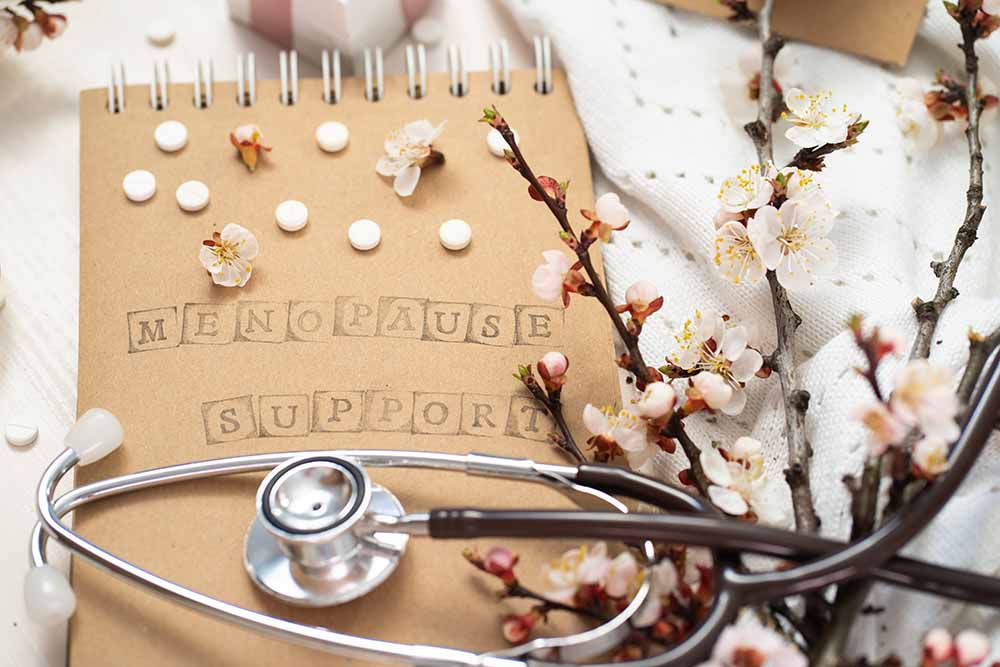Menopause, an intricate and transformative phase in a woman's life, represents the culmination of her reproductive journey. This natural and inevitable biological process typically unfolds between the late 40s and early 50s, ushering in profound changes. At its core, menopause is characterised by the cessation of menstrual cycles and a nuanced interplay of hormonal shifts, predominantly involving oestrogen and progesterone. As we delve into this guide, our aim is to offer a comprehensive understanding of menopause, exploring its various facets such as stages, symptoms, causes, and diverse treatment options. Recognising the intricacies of menopause becomes paramount as women navigate this distinctive journey, providing them with the knowledge needed to manage the accompanying physical and emotional transitions.
What is Menopause?
Menopause is more than a biological endpoint. It is a physiological milestone that symbolises the conclusion of a woman's reproductive capacity. Officially acknowledged when a woman has experienced a 12-month absence of menstrual periods, menopause arises due to the gradual decline in hormonal production by the ovaries, primarily oestrogen and progesterone.
The ovaries, once prolific in producing these essential hormones, now undergo a significant reduction in their functionality. This hormonal ebb triggers a series of physical and emotional changes, marking the transformative shift from the reproductive phase to the postmenopausal stage. The intricate dance of hormones that sustained fertility now wanes, giving rise to a new normal for women entering this unique phase of life.
The journey through menopause is as individualised as the women experiencing it. Some may embrace this transition seamlessly, while others may find it accompanied by a myriad of symptoms. It's within this intricate tapestry that understanding the essence of menopause becomes not just a matter of biological knowledge, but a crucial aspect of empowering women to navigate this profound transformation with grace and informed decision-making. As we unravel the layers of menopause, we embark on a journey that transcends biology, touching upon the emotional, psychological and societal dimensions that shape this transitional period for women.

The Three Stages of Menopause
Navigating through the three stages of menopause is a nuanced journey that unfolds with distinct challenges and transformations. The prelude to menopause, known as perimenopause, initiates a period of irregular menstrual cycles and hormonal fluctuations. This transitional phase, which often spans several years, introduces women to a spectrum of symptoms such as hot flashes, mood swings, and changes in sleep patterns. The unpredictability of perimenopause serves as a precursor to the more definitive changes that come with menopause itself.
Menopause, the central milestone, is officially recognised when a woman completes 12 consecutive months without a menstrual period. Typically occurring around the age of 51, this stage is marked by a sustained decline in hormone production, notably oestrogen and progesterone. The symptoms experienced during menopause vary widely, impacting women both physically and emotionally. Hot flashes, night sweats, and shifts in mood become more pronounced, reflecting the body's adaptation to the altered hormonal landscape.
Post menopause follows menopause, representing the remaining years of a woman's life after the 12-month mark. During this phase, the intensity of symptoms tends to decrease, allowing women to adapt to a new hormonal equilibrium. While some symptoms may persist, post menopause becomes a period of acceptance and adaptation, empowering women to prioritise their overall health and well-being as they transition into the next chapter of life.
Symptoms and Causes of Menopause
Menopause manifests as a complex interplay of symptoms affecting both the physical and emotional realms of a woman's life. Hot flashes, night sweats, mood swings, sleep disturbances, and vaginal dryness emerge as distinctive hallmarks, disrupting daily routines and intimate aspects of personal life. These symptoms, rooted in hormonal fluctuations, particularly the decline in oestrogen, underscore the profound physiological changes accompanying menopause.
The primary cause of menopause lies in the natural aging process, where a gradual reduction in ovarian function leads to diminished hormone production. However, medical interventions like hysterectomy or chemotherapy can expedite this transition. Recognising the nuanced connection between symptoms and causes empowers women to navigate menopause with informed choices, fostering a deeper understanding of this significant life phase and promoting proactive health management.
Treatment Options for Menopause
While menopause is an inevitable and natural phase of a woman's life, the symptoms accompanying this transition can present significant challenges. Fortunately, a diverse range of treatment options exists to address these symptoms and enhance overall well-being. Hormone Replacement Therapy (HRT) stands out as a prevalent and effective approach, involving the supplementation of oestrogen and, in some cases, progesterone to restore hormonal balance. HRT has shown efficacy in alleviating hot flashes, night sweats, and vaginal dryness, providing relief for many women. However, the decision to pursue HRT should be made in consultation with healthcare professionals, considering individual health profiles and potential risks associated with long-term use.
In addition to HRT, non-hormonal medications offer alternatives for managing specific menopausal symptoms. Selective Serotonin Reuptake Inhibitors (SSRIs) and Serotonin-Norepinephrine Reuptake Inhibitors (SNRIs), typically used as antidepressants, have demonstrated effectiveness in managing mood swings and reducing the frequency and intensity of hot flashes. These medications can be a viable option for women who may not be suitable candidates for hormone therapy. Beyond pharmacological interventions, lifestyle modifications play a crucial role in symptom management.
Regular exercise not only contributes to physical well-being but also helps mitigate mood swings and improve sleep quality. A balanced diet rich in nutrients supports overall health, and stress management techniques, such as meditation or yoga, offer holistic approaches to alleviate the psychological impact of menopause. By embracing a combination of medical interventions and lifestyle adjustments, women navigating menopause can tailor their approach to suit individual needs, fostering a smoother transition into this significant phase of life.
Alternative and Complementary Menopause Treatments
In tandem with conventional treatments, a growing number of women are exploring alternative and complementary approaches to effectively manage menopausal symptoms. Herbal supplements have emerged as popular choices, with black cohosh and evening primrose oil being among the most widely recognised. Black cohosh, in particular, is believed to alleviate hot flashes and promote hormonal balance, offering a natural alternative to conventional hormone-based therapies. Evening primrose oil, rich in essential fatty acids, is thought to support overall hormonal health and mitigate symptoms like mood swings and vaginal dryness. However, it's imperative for women to approach these supplements with caution, understanding that their efficacy can vary and potential interactions with medications may exist.
Acupuncture and yoga have gained prominence as holistic practices that contribute to reducing menopausal symptoms and enhancing overall well-being. Acupuncture, an ancient Chinese healing technique, involves the insertion of thin needles into specific points on the body, stimulating energy flow and potentially alleviating symptoms such as hot flashes and sleep disturbances. Yoga, with its focus on breath control, meditation, and gentle movements, has demonstrated effectiveness in reducing stress, improving sleep quality, and promoting emotional balance during menopause.
Additionally, Cognitive-Behavioural Therapy (CBT) provides valuable tools to manage the emotional aspects of menopause, addressing challenges like anxiety and depression. While these alternative approaches offer additional choices for women seeking a personalised and comprehensive approach to managing menopause, it's crucial to consult with healthcare professionals beforehand. This ensures that these alternatives align with individual health needs and do not pose risks or interactions with other medications, ultimately fostering a safe and tailored approach to navigating the diverse landscape of menopause.

Conclusion
Menopause, a profoundly individual and transformative journey, unveils itself uniquely to each woman, marked by a spectrum of experiences and challenges. Armed with comprehensive knowledge about its three stages, diverse symptoms, and an array of treatment options, women gain the ability to navigate this phase with a blend of confidence and grace. Whether choosing conventional treatments like Hormone Replacement Therapy or exploring alternative avenues such as acupuncture and herbal supplements, the overarching goal remains consistent – to enhance overall well-being.
This empowerment extends beyond managing physical symptoms to encompass the emotional and psychological dimensions of this life transition. By embracing the changes that accompany menopause, women can not only weather the challenges but also emerge with a heightened sense of self-awareness and resilience. The journey through menopause becomes an opportunity for self-discovery and growth, fostering a renewed appreciation for the complexity and beauty of the female experience. Ultimately, with knowledge as their compass, women embark on this transformative path with the strength to embrace the evolving chapters of their lives.
FAQs
At what age does menopause typically occur?
Menopause usually occurs around the age of 51, but it can happen earlier or later, varying from woman to woman.
What are the most common symptoms of menopause?
Common symptoms include hot flashes, night sweats, mood swings, sleep disturbances and vaginal dryness, though experiences can differ widely.
Are there natural remedies for menopause symptoms?
Yes, herbal supplements, acupuncture, yoga and lifestyle changes are among the natural remedies some women find beneficial. However, individual responses may vary.
Can menopause be induced by medical treatments?
Yes, certain medical treatments like hysterectomy or chemotherapy can induce menopause earlier than expected. It's essential to discuss potential implications with healthcare providers.